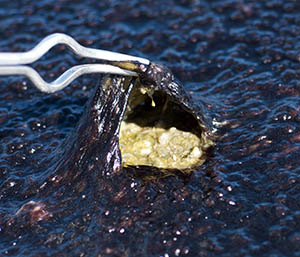We hear many stories of scientists visiting Wikipedia, only to find that knowledge related to their field is missing. A chemist may find certain compounds don’t have an article; a zoologist is likely to find a species of bird isn’t well described. That’s one of the things that inspired us to focus so much energy on improving Wikipedia’s science coverage this year.
But what if a scientist came to Wikipedia, only to discover their entire field was missing? That’s exactly what happened when Dr. Alex Sessions, a professor at Caltech, came across the article on geobiology.
“It was only about 2 paragraphs long and, well, not very good,” he said.
About ten percent of those words described the field this way: “Geobiology is an interdisciplinary field of scientific research that explores interactions between the biosphere and the lithosphere and or the atmosphere.”
The rest explained other fields that were included in geobiology. It was a bit of an identity crisis.
Haunted by those sparse details, the article came immediately to mind when Alice Michel, a fourth-year geobiology student, came to Dr. Sessions for a writing-intensive independent study. “I threw that out as an idea,” he said, “and Alice almost immediately said ‘Yes, let’s do it!’ She wrote the whole wiki page as an independent study project.”
Now, geobiology finally exists! Which is particularly important, because the Wikipedia article is a top-three Google search result for the term. That means Alice’s independent study project is, effectively, the public’s gateway to geobiology.
“I first came across the Geobiology Wikipedia page about three years ago, when I was a freshman trying to decide if I should major in biology or geobiology,” Alice told us. “I was bummed that the page was short and not super informative for my decision, but luckily I chose to do geobiology anyways.”
The article might not have offered very much. Others in Alice’s position may have encountered the article, shrugged, and wrote the whole field off as not all that interesting.
“When I tell people I’m a geobiology major, I typically get a very confused look,” Alice said.

Today, thanks to Alice’s work on the Geobiology Wikipedia article, that same reader might walk away from that article with a million questions. (And a few snazzy trivia points in their pocket: Did you know that Lourens Baas Becking coined the term in 1934 to describe “the relationship between organisms and the Earth?” Now you do.) They would learn the methods behind geobiology, thanks to a nice list with definitions of various techniques. If there’s a word they didn’t understand, they could follow a link to another article that defines it. There’s also a creepy but fascinating photo of some calipers lifting up a microbial mat that’s growing on some acidic soil near the geysers at Yellowstone National Park. It’s cool.
But there’s something else, too: Geobiology is one of the fields trying to understand the primordial soup that created life as we know it. It’s sorting out whether you and your favorite dog came from geyser vents, or meteorites, or something else entirely unexpected.
Suddenly, a reader could ask a million more questions, far beyond “What’s geobiology?” Thanks to Alice’s article, they could ask the kinds of questions geobiologists want to answer. Alice’s article offers an answer to basic questions while preparing us all to ask deeper ones.
“Wikipedia’s audience is definitely really mixed,” Alice said. “That makes the story-telling aspect of science writing really important, because it gets people with less background to follow along without being too mundane for those who may know more. … I had to understand what I was saying, better than if I were rambling away on a term paper. Writing it got me to think about the importance of science communication, especially for young students. I think I’m more interested in the journalistic side of science and the visual portrayal of information as a result.”
She said that writing for Wikipedia helped her focus on the big picture of geobiology, which is precisely what drew her into the field to begin with. As she puts it, “the story of life, and Earth, and all the reasons why we know what we do, and all the questions we still have.”
That’s the beauty of science communication through Wikipedia. So many of us turn to Wikipedia to understand novel science concepts. Focusing on developing the public’s understanding of science requires good, clear communication on Wikipedia. That’s not always there. When instructors work with students to ensure that their topic is presented clearly, it gets read. It makes an impact. After all, writing a description for a paper isn’t science communication, it’s a rehearsal. With Wikipedia, students put their love of science into action. It’s the real deal.
“The clear advantage of having students write Wikipedia articles instead of a conventional term paper is motivation, pure and simple,” Dr. Sessions told us. “They see this as contributing something useful to society … maybe even something their fellow classmates will use some day. [They] work harder and with more enthusiasm than they normally would.”
As someone whose academic career choice included Wikipedia, Alice agreed: “It’s pretty exciting to know that college freshmen and maybe high schoolers might be influenced by something I wrote!”
If you’d like to know more about how these assignments can empower your students to share their passion and curiosity with the public, we’d love to help. We’re still looking for higher ed classrooms to participate in our Year of Science initiative. We offer online trainings for your students, printed handbooks and guides. We take care of the Wikipedia side of things, so you can take care of the rest. Let’s start a conversation: contact@wikiedu.org.
Photo: Yellowstone – Asessions by Alicejmichel – Own work, CC BY-SA 4.0,

Eryk you are such a skilled writer. It’s always worth the read whenever I see your byline. Thank you for your well crafted contributions. We notice and appreciate you. 👏🏽👏🏽👏🏽